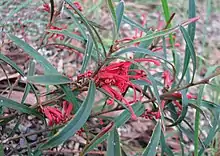Grevillea dimorpha
Grevillea dimorpha, commonly known as flame grevillea or olive grevillea,[2] is a species of flowering plant in the family Proteaceae and is endemic to the Grampians National Park in Victoria, Australia. It is an erect to spreading shrub with elliptic to linear or egg-shaped leaves with the narrower end towards the base, and groups of bright red flowers.
| Flame grevillea | |
|---|---|
 | |
| Im Maranoa Gardens | |
| Scientific classification | |
| Kingdom: | Plantae |
| Clade: | Tracheophytes |
| Clade: | Angiosperms |
| Clade: | Eudicots |
| Order: | Proteales |
| Family: | Proteaceae |
| Genus: | Grevillea |
| Species: | G. dimorpha |
| Binomial name | |
| Grevillea dimorpha | |
| Synonyms[1] | |
| |
Description
Grevillea dimorpha is an erect to spreading shrub that typically grows to a height of 0.4–3 m (1 ft 4 in – 9 ft 10 in). Its leaves are elliptic to linear or egg-shaped with the narrower end towards the base, 50–150 mm (2.0–5.9 in) long and 1.5–20 mm (0.059–0.787 in) wide, the edges turned down or rolled under and the lower surface silky-hairy. The flowers are usually arranged in leaf axils, in down-turned groups of two to sixteen flowers and are bright red, the pistil 21–26 mm (0.83–1.02 in) long. Flowering mainly occurs from August to December and the fruit is an elliptic follicle 12–16 mm (0.47–0.63 in) long, with a bumpy surface.[2][3]
Taxonomy
Grevillea dimorpha was first formally described in 1855 by Ferdinand von Mueller in Transactions of the Philosophical Society of Victoria from specimens collected in the Grampians.[4] The specific epithet (dimorpha) means "having two forms".[5]
Distribution and habitat
Flame grevillea grows in heathy woodland and forest on sandy soil in the Grampians National Park in Victoria.[2][3]
Conservation status
This grevillea is listed as "rare" in Victoria, on the Department of Sustainability and Environment's Advisory list of rare or threatened plants in Victoria.[6]
References
- "Grevillea dimorpha". Australian Plant Census. Retrieved 26 March 2022.
- "Grevillea dimorpha". Australian Biological Resources Study, Department of Agriculture, Water and the Environment: Canberra. Retrieved 26 March 2022.
- Makinson, Robert O. "Grevillea dimorpha". Royal Botanic Gardens Victoria. Retrieved 26 March 2022.
- "Grevillea dimorpha". APNI. Retrieved 26 March 2022.
- Sharr, Francis Aubi; George, Alex (2019). Western Australian Plant Names and Their Meanings (3rd ed.). Kardinya, WA: Four Gables Press. p. 184. ISBN 9780958034180.
- "Advisory list of rare or threatened plants in Victoria" (PDF). The State of Victoria Department of Environment and Primary Industries. Retrieved 26 March 2022.